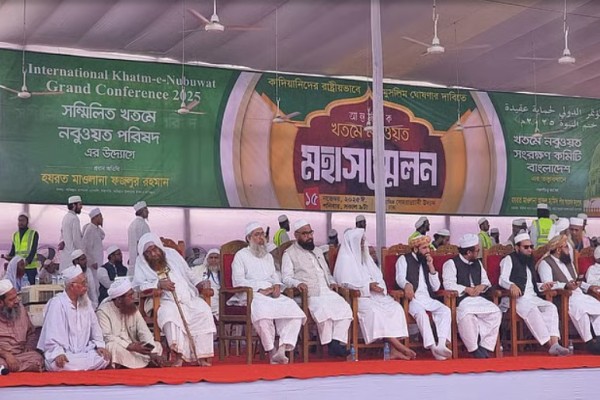
A series of fiery speeches by visiting Pakistani clerics at a massive Khatme Nabuwat gathering in Dhaka has triggered alarm among observers, even as Jamiat Ulema-i-Islam-Fazl (JUI-F) chief Maulana Fazlur Rehman separately called for deeper Pakistan–Bangladesh ties and invoked a shared “unity of faith” between the two nations.
Speaking at the Khatm-e-Nabuwwat conference at Suhrawardy Ground, Dhaka, the JUI-F chief said “unity of faith was a stronger bond between the two nations that cannot be abolished,” according to Dawn (Nov 16, 2025). He told the audience that Pakistan’s delegation had come “to convey a message of goodwill” and emphasised that Muslims in both countries were part of “a single Ummah”. Participants at the event were also seen carrying Palestinian flags, Dawn reported.
But a parallel set of speeches at the same venue drew far sharper reactions. In what CNN-News18 described as a major exclusive, two of Pakistan’s most influential clerics — Maulana Fazlur Rehman and Maulana Aurangzeb Farooqui — used the gathering at Sohrawardy Udyan to openly urge Bangladesh to adopt a Pakistan-style blasphemy framework and declare the Ahmadiyya (Qadiani) community non-Muslim.
The outlet reported that more than 35 Pakistani clerics were in attendance, with 19 of them delivering speeches. It added that the tone shifted dramatically when the two senior leaders pressed Dhaka’s religious establishment to follow Pakistan’s precedent and demanded that the Ahmadiyya community be officially excluded from the Muslim fold.
In one of the most contentious moments, CNN-News18 cited Fazlur Rehman as telling the crowd: “We have bled in Pakistan to honour our Prophet, we will bleed again if needed. They are Kafirs and you must uphold the honour of prophets like us.”
However, a veteran analyst in Bangladesh told Stratnewsglobal.com that “If anything, it could very well backfire. Just a pointer, the average Bangladeshi, especially the newer generation, prefers to be known as being ‘non-communal’ as against being ‘secular’. ”
Bangladesh’s Suhrawardy Udyan — historically associated with the liberation struggle and the 1971 Pakistani army surrender — hosted clerics from Bangladesh, Pakistan, India, Saudi Arabia and Egypt. The event was organised by the Sammilit Khatme Nabuwat Parishad and the Khatme Nabuwat Protection Committee Bangladesh.
A detailed report by The Daily Star (Nov 16, 2025) said this was the first international Khatme Nabuwat conference held in Bangladesh, drawing around 90 clerics, scholars and political leaders from multiple countries. Its central demand was the formal declaration of the Ahmadiyyas as non-Muslim — a call echoed repeatedly by speakers throughout the day.
According to The Daily Star, organisers announced a year-long programme including nationwide signature drives, memorandums to district authorities, and divisional conferences leading up to a national ulema-mashayekh assembly in December 2026 if their demands remained unmet.
Speakers at the Dhaka event alleged that the Ahmadiyya community “hurt the religious sentiments” of the Muslim majority and reiterated claims that those who accept prophets after Muhammad fall outside Islam. Several clerics, including leaders from Bangladesh’s BNP, Jamaat-e-Islami, Islami Andolon Bangladesh, Khelafat Majlis and Hefazat-e-Islam, supported tougher measures. BNP Standing Committee member Salahuddin Ahmed said constitutional changes would be pursued “through discussions in parliament”.
The conference also featured prominent foreign scholars, among them Pakistan’s Ilyas Ghuman, Hanif Jalandhari and Ahmad Yusuf Binnuri; India’s Deoband leader Abul Qasim Nomani and Jamiat Ulema-e-Hind president Mahmood Madani; Saudi Arabia’s Sheikh Abdur Rauf Makki; and Egypt’s Sheikh Musab Nabil Ibrahim.
The event took place amid a warning letter from the Ahmadiyya Muslim Jama’at to Bangladesh’s chief adviser earlier this month, requesting state protection and citing concerns about potential violence linked to the rally and its related activities.
In a career spanning three decades and counting, Ramananda (Ram to his friends) has been the foreign editor of The Telegraph, Outlook Magazine and the New Indian Express. He helped set up rediff.com’s editorial operations in San Jose and New York, helmed sify.com, and was the founder editor of India.com.
His work has featured in national and international publications like the Al Jazeera Centre for Studies, Global Times and Ashahi Shimbun. But his one constant over all these years, he says, has been the attempt to understand rising India’s place in the world.
He can rustle up a mean salad, his oil-less pepper chicken is to die for, and all it takes is some beer and rhythm and blues to rock his soul.
Talk to him about foreign and strategic affairs, media, South Asia, China, and of course India.




